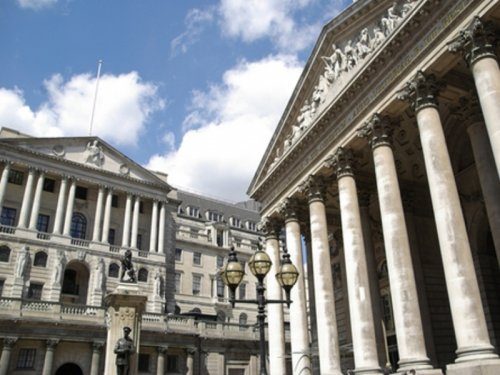Bank of England cuts growth forecasts amid Brexit fears

The Bank of England voted unanimously today to leave interest rates unchanged, while also cutting growth forecasts in the ominpresent shadow of Brexit.
The nine-member monetary policy committee (MPC) all voted to leave interest rates on hold, at 0.75%, amid fears that UK economic growth could stall during the second quarter faced with the prospect of a no-deal Brexit.
The Bank slashed growth forecasts to zero, from 0.2%.
It warned that risks to growth have increased with uncertainty over Brexit and that companies believe this will persist, while the prospect of firms increasing investment in Britain remain slim.
The Bank said the pound had dropped in value on the foreign exchanges given “the perceived likelihood of a no-deal Brexit has risen,” while mounting tensions over international trade amid the US-China trade dispute had also slowed the economy.
“Underlying growth in the UK appears to have weakened slightly in the first half of the year relative to 2018,” the MPC said.
It said some companies are now running down stockpiles built up ahead of the original March 29 Brexit deadline – now delayed until the end of October – which could affect future economic growth.
The rush to build up emergency supplies of goods and raw materials had previously helped boost GDP growth to 0.5% in the first quarter.
However, goods trade with the EU weakened sharply in April, according to the MPC, in a sign companies were running down stock.
Most businesses surveyed by the Bank believe Brexit uncertainty will not be resolved by the end of the year.
However, in the unlikely event that Brexit will be resolved, the MPC said that an ongoing increase in interest rates would be required at a gradual pace and to a limited extent to maintain its inflation target of 2%.
Russ Mould, investment director at Manchester investment company AJ Bell, said today’s MPC announcement was no surprise.
“With virtually every other central bank in the world taking a softer line in 2019 it would have been remarkable had the Bank of England taken a tougher stance on monetary policy.
“The 9-0 vote to leave policy unchanged is, therefore, perfectly in keeping with the concerns that the Bank continues to express about the economic implications of Brexit and wider concerns over global growth,” says Russ Mould, investment director at AJ Bell.
“Australia, New Zealand, Chile, India and Russia have all cut interest rates this year and the Federal Reserve continues to lay the groundwork for looser policy.
“Markets now think there is a 100% chance of a rate cut from the US central bank in July, with a one-third chance of a half-point reduction. The European Central Bank also seems to be preparing further monetary stimulus.
“The chances of the Bank of England looking to join Norway and the Czech Republic among those who have increased interest rates in 2019 look pretty slim, especially as any unexpected tightening of policy could give sterling a boost and perhaps hamper exports at what remains a delicate time for the UK economy.
“At least the doveish stance will be good news for those people on variable rate mortgages, although savers are likely to be less pleased.
“Interest rates on cash accounts have been so low for so long that cash savings are going backwards in real terms as inflation continues to outstrip savings rates.
“This, in turn, may explain why global stock markets have put on a spurt this week, in the view that central banks are more likely to cut interest rates and returns on cash than increase them.
“That has dragged down yields on fixed-interest instruments such as Government bonds and left savers will few options when it comes to finding income, with the stock market in some ways the default choice for those who are hoping to protect their savings from even the lowly rate of inflation that we have today.”









